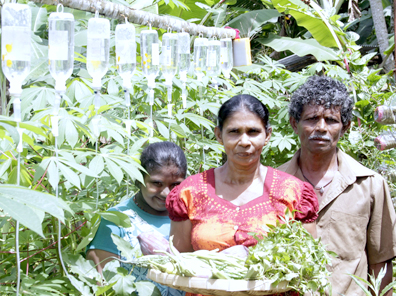Sustainable agri program to alleviate poverty
Program marks decade of rural empowerment:
By Sanjeevi Jayasuriya
Promoting organic farming and enabling a steady monthly income to a
family are two aspects that support healthy living. This has been
achieved through a Corporate Social Responsibility (CSR) initiative of
Ceylon Tobacco Company PLC (CTC).
The CSR project, Sustainable Agricultural Development Program (SADP)
was launched at a time when poverty levels were at 15% in Sri Lanka, to
support a national priority, achieving one of the Millennium Development
Goals - alleviating poverty.
|

Some of the beneficiaries of the SADP program.
PICTURE: SALIYA RUPASINGHE |
The program, which recently celebrated a decade of rural empowerment
has thus far showcased positive results, going beyond self-sustenance to
achieving economic benefits amongst rural communities.It empowers
families with agriculture knowledge and resources such as seeds, plants
and poultry thus encouraging home gardening in addition to bee-keeping,
mushroom cultivation and goat raring.
The focus is on creating a long-term engagement between the
beneficiaries and their path towards self-sustenance. The selected
families are part of SADP for a period of two and half years and
regularly monitored by a dedicated field officer.
A team of media personnel visited Deegoda in the Galle district where
some of the beneficiaries under the SADP reside, along with field
officer Anslem Nanayakkara.
"We are happy to be a part of the SADP as we have been able to
improve our monthly income since we joined the program. We also get to
eat more fresh vegetables now. We have made use of our garden space
economically and this has created an eco-friendly environment," D.G.
Siriyalatha, one of the beneficiaries said.
Sriyalatha, with D.G. Soorasena and K.H.A. Karunawathie have been
with the program for five and half months. Some of the families we met
have reached the expected level in organic farming and animal husbandry
under SADP. Hence they receive no further assistance.
S. Indralatha said, "Our income is at a satisfactory level and we do
not have to do odd jobs to meet our ends any longer.
We are self sufficient and excess produce is sold at the market to
earn extra income. Our lives have become more fulfilling due to SADP and
we are grateful to the program offered by the CTC." Pradeep Kumara Lanka
and B.B. Inoka also shared similar views.
CTC's Chief Executive Officer and Managing Director Michael Koest
said, "At a time when the country's national priority was alleviating
poverty which was at 15%, CTC brought in the company's expertise in
agriculture to empower individuals through SADP. The program started in
2005 as a pilot project with 100 families and thereafter fully launched
in 2006. SADP envisioned guiding beneficiaries towards achieving
self-sustenance through knowledge and resources, with a strict policy of
no cash assistance and has aptly done so in the past 10 years. We are
confident that SADP will continue to sustainably empower underprivileged
communities in the future."
CTC's Legal and External Affairs Director Dinesh Dharmadasa said,
"With the continued expansion of SADP, the CSR arm of the company
decided to set up a separate company to establish better control and
governance over its development. As such, Outreach Projects (Guarantee)
Limited was launched in 2007 with a Board of Directors, Chief Operating
Officer, General Manager and a well-designed structure to ensure
effective achievement of the project's objectives."
The program operates with a concept 'helping those who are willing to
help themselves', by providing the necessary inputs, raw materials,
knowledge and guidance to start-up and operate successful home
gardens.\The SADP was aimed at families whose monthly income is less
than Rs. 3,943 and with a land area of 20-40 perches for cultivation
with access to water for at least 10 months of the year.
The benefits of SADP include enabling self-sufficiency, mitigating
malnutrition, promoting organic farming and agriculture knowledge
development. |

